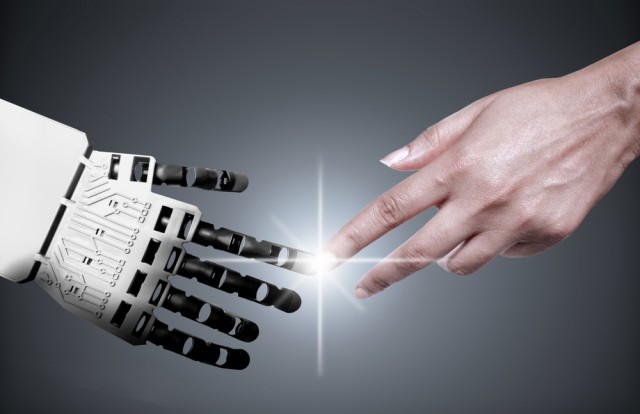9 ways AI can transform your employee experience

The future of work is happening now: despite skeptics prophesying growing unemployment rates, AI not only creates new job roles but also changes the employee experience for the better. Assisted with AI tools and analytics, workers no longer have to spend hours (and, consequently, years) on meaningless routines, since they can focus on job aspects that truly bring value.
So how will artificial intelligence transform employee experience and enhance employee engagement? Read on to learn how AI contributes to digital workplace transformation.
Ways How AI Is Transforming the Workplace
From reducing time-to-hire to automating boring rule-based tasks, AI tools not only increase efficiency but also change employee experience for the better. How can AI be used in the workplace? Check out these examples.
- Recruiting and personnel evaluation
While traditionally the recruiting process takes weeks or even months, AI tools help recruiters sift through hundreds of resumes and create a pool of prospective candidates. AI tools can also automatically schedule interviews with key company personas, evaluate candidates' skills, and even write better job descriptions to attract more job seekers. Needless to say, all of the above accelerates the recruiting process and improves employees’ work experience at the entry-level.
- Automating repetitive tasks
Currently, almost every position involves simple and repetitive tasks, which, nevertheless, may consume hours and distract workers from their core responsibilities. For example, instead of focusing on an informative press-conference agenda, PR specialists could be spending hours emailing invitations and writing responses. AI fixes that by handling boring manual work.
AI tools can also be highly useful when it comes to recording meetings, transcribing them, and sending meetings notes to participants. Apart from boosting productivity, AI automation eliminates human error, which helps propel an organization forward on all levels.
- Improving internal communications
HR managers have busy work routines, which they often have to interrupt in order to respond to employee inquiries. These inquiries are often repetitive and fall into certain typical categories. AI chatbots can handle typical employee questions faster than HR managers -- on top of that, they can provide employees with detailed comprehensive info that HR managers may occasionally omit. A different kind of AI tools enhance the communication of international distributed teams by providing real-time translations of conference calls.
- Supporting marketing, customer service and sales
Similarly, AI chatbots can not only improve internal communications but also enhance customer service by offering clients 24/7 availability and support. Travel bots, for example, can book hotels and schedule trips for customers based on their budget and preferences. Marketing bots can automatically collect and analyze important metrics, create lists of clients sharing common characteristics and automate work areas that traditionally consume a great portion of the marketer’s time.
- Making sense of business-critical data
Despite the fact that most companies recognize the value big data analytics can bring, they often fail to use it for one simple reason -- good data scientists are still extremely hard to find. Alternatively, AI tools can assume similar functions helping businesses gain insights from data, recognize data patterns, and even carry out predictive analysis for their company and brands.
- Helping eliminate fraud
Increased connectivity places high demands on company security. As of today, most of the advanced security systems are AI-based. While traditional security tools help eliminate known threats, AI-driven security solutions are capable of detecting unknown security hazards and preventing malicious attacks. AI tools help protect financial fraud, detect insider threats to company security by spotting non-typical user activity. Most importantly, AI-based security systems help protect the sensitive data of both employees and employers.
- Transforming employee training and development
Microlearning and personalized learning are huge workplace trends since they support the concept of lifelong education embraced by millennials. Moreover, research reveals employees may even leave you for competitors if you fail to offer them educational opportunities within their workplace. With this respect, AI tools have a lot to offer. From small portions of learning content delivered via messengers any time they have a break, to complex evaluation tools helping to detect the knowledge gaps and tailor individual learning programs, AI can have a great impact on employee training and development.
- Improving remote work
In the future, remote work may become ubiquitous. Even though today we mostly picture programmers, administrative workers, or designers working remotely, in as little as five years, remote work may just as well refer to heavy manufacturing, oil drilling, construction, warehousing or any other area currently unthinkable without human intervention. How artificial intelligence is impacting today's enterprise workplace is impossible to imagine without mentioning AI-driven telerobotics.
In the near future, telerobots controlled from a distance using VR may replace human workers in enterprise environments. Mechanical engineers operating such machines may perform complex and dangerous tasks like fixing oil pipe leakages or working on construction sites of highrise buildings. Needless to say, the positive impact of such solutions on employee security is hard to overestimate.
- Contributing to workplace optimization
With the help of AI, digital workplace transformation may become a reality in the most literary sense. In the future, AI may create personalized workplaces tailored exactly to workers’ individual needs. The lighting, the temperature, workers’ seats, and desks, and even how they like their coffee will be taken into account to create personalized employee experiences. With sensors and connected devices becoming omnipresent, AI implementation in the workplace is bound to become a new reality.
How Technology Will Change the Future of Work
Artificial intelligence in the workplace has immense potential to improve employee experience, help workers focus on creative tasks instead of routine processes, eliminate errors, improve both internal communications and customer service, boost productivity, deliver advanced business analytics, and create better work/life balance. Moreover, it’s an integral part of digitally transforming your organization.
The implementation of cutting edge technologies won’t happen overnight, though. Re-educating employees and coaching them to work alongside the digital workforce will take time and investment.
Ultimately though, the outcome will be totally worth the effort: improved employee experience spells higher job satisfaction, loyalty, and engagement, which will surely help enterprises gain a distinct competitive edge.
Photo Credit: Pixelbliss/Shutterstock
 Alexey Chalimov is CEO at Eastern Peak. A long term technology enthusiast, he enjoys bringing new technology products to market.
Alexey Chalimov is CEO at Eastern Peak. A long term technology enthusiast, he enjoys bringing new technology products to market.